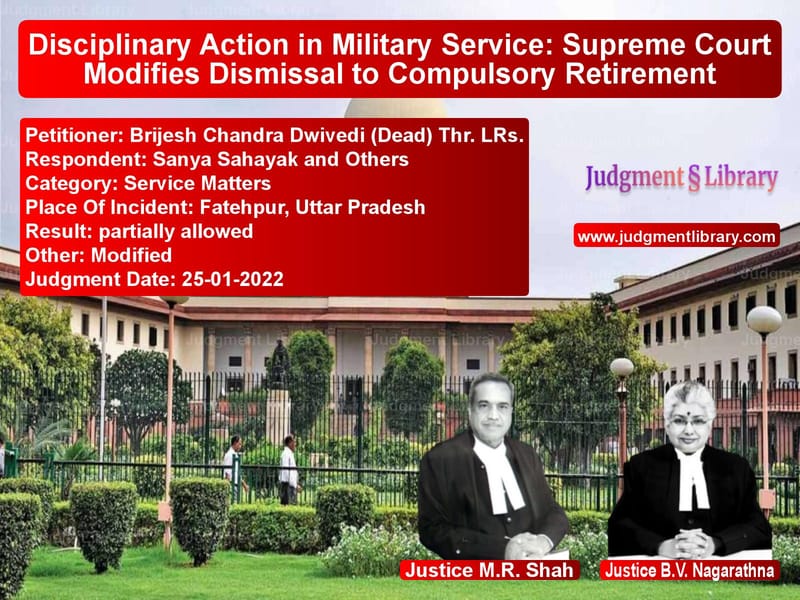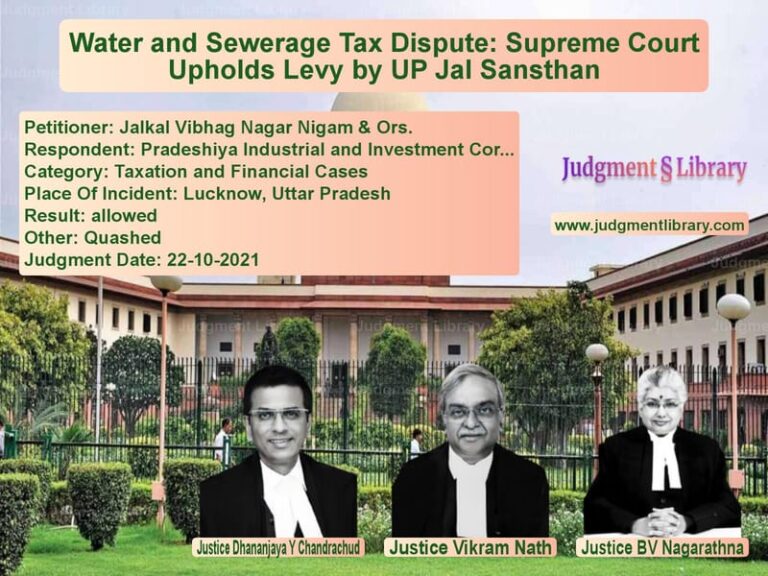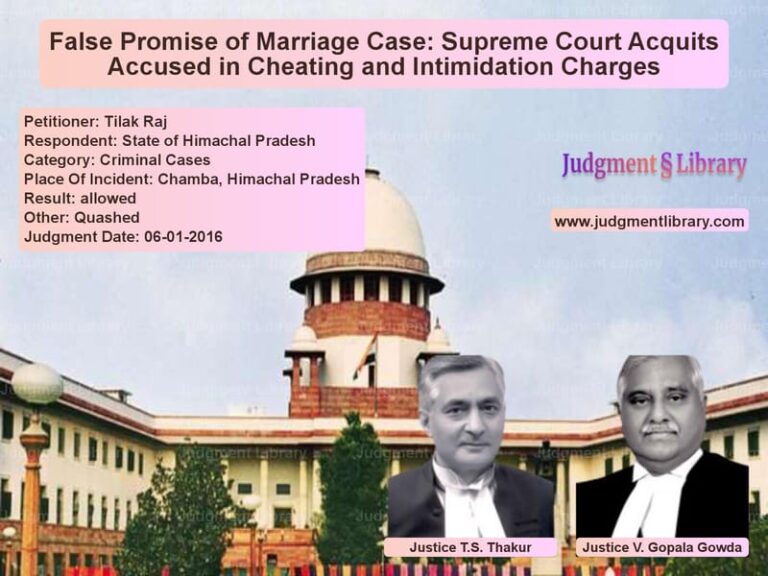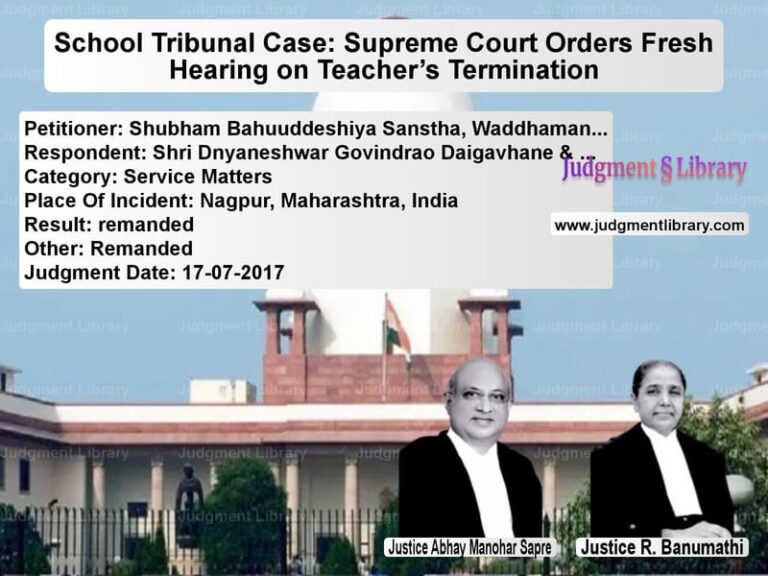Disciplinary Action in Military Service: Supreme Court Modifies Dismissal to Compulsory Retirement
The Supreme Court of India recently ruled in a case involving the dismissal of a government driver from service for misconduct. The case, Brijesh Chandra Dwivedi (Dead) Thr. LRs. vs. Sanya Sahayak and Others, involved an employee of the Provincial Armed Constabulary (P.A.C.) who was dismissed for driving under the influence of alcohol while on duty. The Court ultimately modified the dismissal to compulsory retirement, considering the unique circumstances of the case.
Background of the Case
The appellant, Brijesh Chandra Dwivedi, was a driver posted at the 12th Battalion, P.A.C. Fatehpur. On February 2, 2000, while driving a truck carrying P.A.C. personnel for Kumbh Mela duty from Fatehpur to Allahabad, his truck collided with a jeep. Following the accident, he was medically examined and found to be under the influence of alcohol. A departmental inquiry was initiated, and he was ultimately dismissed from service.
After his dismissal, Dwivedi challenged the decision before the Allahabad High Court, arguing that the punishment was disproportionate to the misconduct. However, the High Court upheld his dismissal. Subsequently, he appealed to the Supreme Court, and during the pendency of the appeal, he passed away. His legal heirs continued to pursue the case.
Petitioner’s Arguments
The appellant’s counsel contended that:
- The accident was minor and resulted only in vehicle damage, not loss of life.
- Considering the appellant’s 25 years of service, dismissal was an excessive punishment.
- The appellant had not consumed alcohol before taking charge of the vehicle but drank after the accident due to stress.
- The punishment should be converted into compulsory retirement.
Respondent’s Arguments
The respondents countered by asserting:
- The High Court had carefully reviewed the disciplinary proceedings and upheld the punishment.
- The appellant had a history of misconduct, including habitual drinking and insubordination.
- Driving a vehicle under the influence of alcohol, particularly one carrying armed personnel, was a serious offense.
- The accident could have been fatal, and leniency would set a dangerous precedent.
Supreme Court’s Observations
The Supreme Court, comprising Justices M.R. Shah and B.V. Nagarathna, acknowledged that driving under the influence of alcohol was a grave misconduct, especially for a driver responsible for armed personnel. The Court stated:
“Driving a truck carrying P.A.C. personnel under the influence of alcohol is a very serious misconduct and such an indiscipline cannot be tolerated and that too in the disciplined Military.”
At the same time, the Court also considered mitigating factors, such as:
- The appellant’s 25 years of service.
- The fact that the accident was not fatal.
- His claim that he consumed alcohol after the accident.
- His death during the pendency of the appeal, affecting his family’s financial security.
Final Judgment
The Supreme Court ruled that while the dismissal was justified given the gravity of the misconduct, it was too harsh under the specific circumstances. The Court, therefore, modified the dismissal to compulsory retirement, stating:
“In the peculiar facts and circumstances of the case, the award of punishment of dismissal can be said to be too harsh. The punishment of dismissal is directed to be converted into compulsory retirement.”
The Court further directed that the appellant’s legal heirs should receive death-cum-retirement benefits, including family pension.
Legal Implications
This judgment sets an important precedent on disciplinary actions in government service:
- While strict disciplinary actions are necessary in armed forces, mitigating factors must be considered.
- Courts can intervene to modify punishments if they appear excessively harsh.
- Death of an employee can influence the nature of relief granted to ensure financial security for legal heirs.
Conclusion
The Supreme Court’s decision balances disciplinary enforcement with considerations of fairness and financial security for the deceased employee’s family. The ruling reinforces that while misconduct in uniformed services must be dealt with strictly, punishment should not be unduly harsh when mitigating factors exist.
Petitioner Name: Brijesh Chandra Dwivedi (Dead) Thr. LRs..Respondent Name: Sanya Sahayak and Others.Judgment By: Justice M.R. Shah, Justice B.V. Nagarathna.Place Of Incident: Fatehpur, Uttar Pradesh.Judgment Date: 25-01-2022.
Don’t miss out on the full details! Download the complete judgment in PDF format below and gain valuable insights instantly!
Download Judgment: brijesh-chandra-dwiv-vs-sanya-sahayak-and-ot-supreme-court-of-india-judgment-dated-25-01-2022.pdf
Directly Download Judgment: Directly download this Judgment
See all petitions in Disciplinary Proceedings
See all petitions in Termination Cases
See all petitions in Public Sector Employees
See all petitions in Judgment by Mukeshkumar Rasikbhai Shah
See all petitions in Judgment by B.V. Nagarathna
See all petitions in partially allowed
See all petitions in Modified
See all petitions in supreme court of India judgments January 2022
See all petitions in 2022 judgments
See all posts in Service Matters Category
See all allowed petitions in Service Matters Category
See all Dismissed petitions in Service Matters Category
See all partially allowed petitions in Service Matters Category







